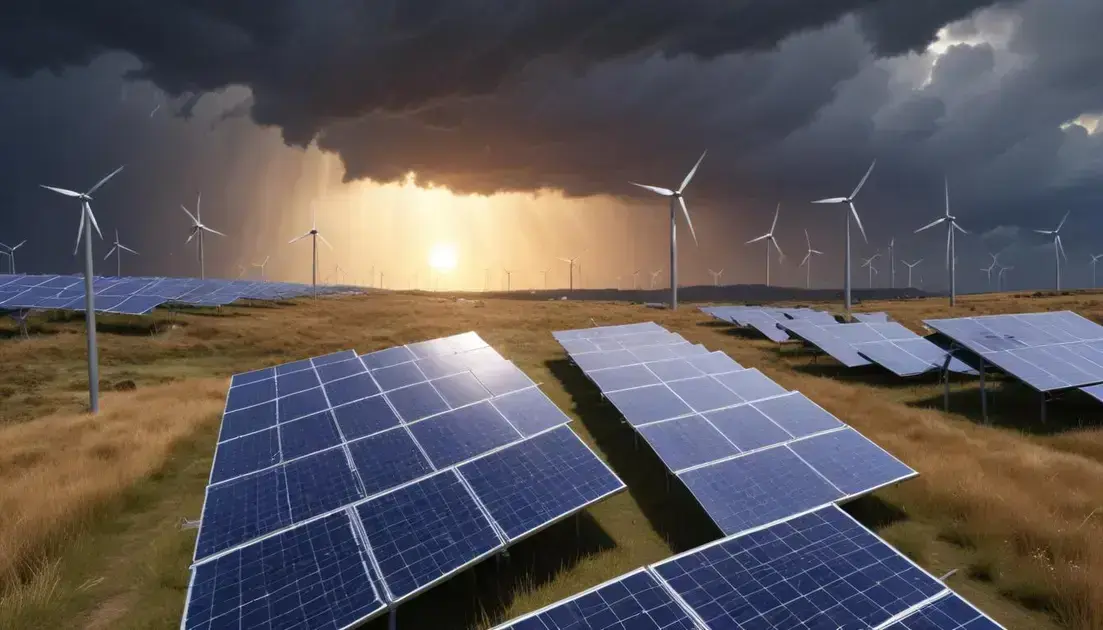Standard Chartered’s Latest Green Deal Enhances Resilience
Adaptation Finance is essential for enhancing climate resilience through innovative investments, primarily driven by the private sector’s capital and expertise, aimed at developing sustainable projects that effectively address climate challenges.
In today’s rapidly changing climate, Adaptation Finance is becoming increasingly vital. Standard Chartered’s latest deal with JinkoSolar is a prime example of how innovative financing can strengthen energy resilience. Curious about how this affects the broader sustainability landscape?
Overview of Standard Chartered’s adaptation finance deal
Standard Chartered’s recent adaptation finance deal marks a significant step towards enhancing climate resilience in vulnerable regions. This initiative aims to address the pressing need for robust sustainable energy solutions. By collaborating with innovative companies like JinkoSolar, Standard Chartered is spearheading transformative projects that not only generate renewable energy but also protect infrastructure against climate-related disasters.
Investment in Renewable Technologies: The focus on renewable technologies is pivotal in mitigating the impacts of severe weather events. Solar energy projects, in particular, are being prioritized to harness the sun’s power in areas most affected by climate change. Such investments foster energy independence while reducing carbon emissions, aligning perfectly with global sustainability goals.
The deal exemplifies how strategic financial instruments can mobilize private sector funding to support projects that might otherwise struggle to secure investment. By bridging the gap between financing and implementation, Standard Chartered is cultivating an ecosystem where adaptation finance thrives.
Furthermore, the collaboration serves as a model for future projects seeking to integrate resilient solutions in energy infrastructure. This proactive approach not only safeguards communities but also paves the way for a more sustainable growth trajectory in the finance sector.
Impact of climate-related disasters on infrastructure
The impact of climate-related disasters on infrastructure is increasingly alarming. Extreme weather events, such as hurricanes, floods, and droughts, pose significant threats to public and private infrastructure systems. These disasters not only disrupt daily life but also lead to costly repairs and long-term economic challenges.
Vulnerability of Key Structures: Transportation networks, power grids, and water supply systems are particularly vulnerable. When severe weather strikes, roadways can become impassable, power outages can last for days, and water systems may be contaminated. This vulnerability can result in significant setbacks for communities attempting to rebuild and recover.
Furthermore, climate change exacerbates the frequency and intensity of these disasters. As temperatures rise, regions that were once stable face increased flooding and infrastructural wear. This reality demands urgent adaptation strategies to bolster resilience.
Investment in robust and adaptable infrastructure is crucial. By incorporating advanced materials and sustainable practices, cities can enhance their ability to withstand climate impacts. It’s not just about recovery; it’s about creating systems that are proactive against future climate threats.
Significance of JinkoSolar’s technology
JinkoSolar’s technology plays a crucial role in addressing the challenges posed by climate change. As one of the world’s largest solar panel manufacturers, their innovative products are designed to maximize efficiency and durability. This is especially vital in the context of resilience against climate-related disasters.
High-Efficiency Solar Panels: JinkoSolar’s panels are known for their advanced photovoltaic technology, which significantly boosts energy conversion rates. By harnessing solar power more effectively, these panels contribute to cleaner energy solutions. This is essential for communities looking to reduce their carbon footprints while ensuring reliable power supply.
The company also focuses on sustainability in its manufacturing processes. By employing eco-friendly practices and materials, JinkoSolar not only enhances the lifecycle of their products but also supports global sustainability initiatives. This aligns with the urgent need for industries to shift towards greener alternatives.
Moreover, JinkoSolar’s technology enables scalable solutions for diverse environments, reinforcing urban and rural infrastructure alike. With the integration of their solar solutions, communities can achieve greater energy independence and resilience, crucial for adapting to future climate scenarios.
The role of private sector in adaptation finance
The role of the private sector in adaptation finance is becoming increasingly critical as the world faces severe climate challenges. Private companies bring not only capital but also innovation and expertise that can drive impactful solutions for climate resilience.
Partnerships and Investments: Collaborations between public entities and private firms can pool resources to fund projects aimed at enhancing adaptive capacity. This type of partnership is vital for scaling solutions to meet urgent climate needs, particularly in infrastructure and urban development.
Moreover, private investors are increasingly recognizing the financial returns associated with sustainable projects. Investments in adaptation finance can yield long-term benefits, such as reduced disaster recovery costs and enhanced community resilience. By prioritizing sustainability, businesses can enhance their competitiveness while addressing environmental challenges.
Furthermore, companies specializing in technology and renewable energy can spearhead innovative solutions that bolster adaptation efforts. Their expertise helps in designing projects that not only withstand climate impacts but also promote sustainability. This proactive approach positions private entities as key collaborators in the global climate agenda, fostering a more sustainable future.
Future prospects for sustainable finance initiatives
The future prospects for sustainable finance initiatives appear promising as awareness of climate change and environmental issues continues to rise. Investors are increasingly prioritizing sustainability, seeking opportunities that provide both economic returns and positive societal impacts.
Market Demand for Green Investments: As consumers become more environmentally conscious, businesses are adapting by integrating sustainable practices. This shift drives demand for green bonds and investment funds focused on eco-friendly projects, creating a robust market for sustainable finance.
Moreover, regulatory frameworks are evolving to support sustainability goals. Governments worldwide are implementing policies that encourage investments in renewable energy, energy efficiency, and climate-resilient infrastructure. Such regulations bolster the confidence of investors, making sustainable finance not just desirable but essential.
Technological advancements are also playing a pivotal role in the future of sustainable finance. Innovations in data analysis and reporting will enhance transparency, enabling investors to track the impact of their investments more effectively. This increased accountability fosters trust and encourages further investments in sustainable initiatives.
Engagement between the private sector, public institutions, and civil society will be critical in advancing these efforts. By collaborating towards common goals, stakeholders can create a sustainable financial ecosystem that supports long-term resilience and prosperity.
Understanding the Importance of Sustainable Finance
The journey towards a sustainable future is not just a trend but a necessity for our planet. Sustainable finance initiatives are essential in driving investments that protect our environment while fostering economic growth.
As we’ve seen, collaboration among the private sector, public institutions, and communities can lead to innovative solutions that enhance resilience against climate challenges. By embracing sustainable practices, businesses can create value and ensure their survival in a changing world.
Looking ahead, the demand for sustainable finance will likely grow, offering opportunities for investors and businesses alike. By committing to sustainability, we contribute to a healthier planet and a better future for generations to come.
Thus, it is crucial for all stakeholders to understand their role in this transformation. Together, we can make a difference and create a sustainable economic landscape that benefits everyone.
Frequently Asked Questions
What is sustainable finance?
Sustainable finance refers to financial investments that consider environmental, social, and governance (ESG) factors to create positive social impact along with financial returns.
Why is the private sector important in adaptation finance?
The private sector plays a crucial role in adaptation finance by providing the necessary capital, expertise, and innovation for sustainable projects that enhance climate resilience.
How can businesses benefit from investing in sustainable initiatives?
Businesses can benefit from sustainable initiatives through cost savings, improved brand reputation, and access to new markets that prioritize environmentally friendly practices.
What are green bonds?
Green bonds are fixed-income instruments specifically designed to raise funds for projects that have positive environmental impacts, such as renewable energy and energy efficiency projects.
How can technology enhance sustainable finance?
Technology can enhance sustainable finance by improving transparency, tracking investments, and providing data analysis tools that help assess the impact of sustainability initiatives.
What is the future outlook for sustainable finance?
The future outlook for sustainable finance is very positive, with increasing demand for green investments and supportive regulatory frameworks that encourage sustainability initiatives.






